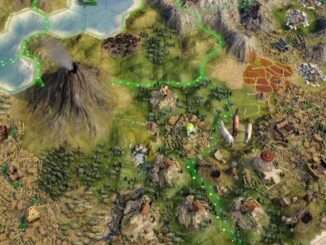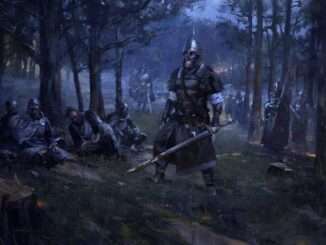
Guide to Characters
Introduction
The addition of families and the need to produce an heir brings us inevitably to the topic of Characters, and this is another striking difference between other 4x games and Old World.
Each family you select as a vassal family is populated with a number of individuals who can marry and have children of their own (with your approval, naturally). Some like you, and some don’t, so at least some of your diplomatic efforts must be inwardly focused, because keeping your vassal families happy is key to your long-termsuccess. Should they get too upset with you and your rule, you’ll find yourself facing open rebellion, which canand will diminish your ability to deal with external threats.
In addition to keeping your vassal families as a whole happy, your relationship with individual characters within each family matters too. If you appoint someone to be an Ambassador, for instance, and that person despises you, then you’ll find that diplomatic missions are more expensive to run.
On top of that, there are other National leaders to interact with, and religious leaders, once religions begin to take root and spread in the game world.
That’s a lot of people to keep happy, and the equation is constantly shifting and changing as the in-game situation evolves, which means that you’re going to have your hands full just dealing with the intricacies of diplomacy in Old World (both internal and external) which is quite unlike anything you’ve ever experienced in Civ.
Characters are defined by four in-game stats: Charisma, Courage, Discipline and Wisdom.
The higher these stats are, the more effective that character is at certain things. In brief, here’s what the stats do:
Charisma
If the character in question is a leader, spouse, governor, or on your diplomatic staff (Ambassador, Chancellor, Spymaster) then each point of Charisma will increase your nation’s Civics, each turn.
If the character in question is a general, then eachpoint of Charisma will increase the defensive strength of the unit that the general is leading.
Courage
If the character in question is a leader, spouse, governor or on your diplomatic staff, then each point of Courage will increase your military training point total, each turn.
If the character in question is a General, then each point of Courage will increase the attack strength of the unit that the general is leading.
Discipline
If the character in question is a leader, spouse, governor or on your diplomatic staff, then each point of Discipline will increase your nation’s gold, every turn.If the character in question is a General, then each point of Discipline will increase the XP of the unit that the General is leading, each turn.
Wisdom
If the character in question is a leader, spouse, governor, or on your diplomatic staff, then each point of Wisdom will increase your research rate, each turn.
If the character in question is a General, then each point of Wisdom will increase the % chance of that unit scoring a critical hit, each attack.
Note that your leader’s stats, and the stats of the leader’s spouse “count for more” in terms of additions to the top line of your economy. While the other members of your Court will add nominally to your total national output, they won’t do so at the same level as your leader and his/her spouse.
Also note that the bonuses gained via stats progression is not linear, which is to say, you get a bigger bonus by moving from 4 Wisdom (or whatever stat) to 5 than you do when you move from 1 to 2.
You’ll find a table in the Appendix that spells this out in more detail (see Table 1.0, in the Appendix).
There are more than three thousand events in the game so far, and many of these are events that give you an opportunity to shape and mold the members of your Royal Court to your liking, usually in the form of increasing one of the stats above by +1 point (and note that these stats can be negative, in which case, they would reduce your Civics, Training Points, research, money, etc, rather than increasing those totals).
In addition to that, each character may have up to three negative traits and up to three positive traits that will modify their stats and abilities. For instance, you might have a Drunk, Blessed, Slothful grandson, and all of those traits would stack, modifying his or her abilities.Finally, when characters come of age, you may select an archetype for them. Archetypes are powerful and also modify thecharacters core stats that we just talked about.
In addition to that, however, archetypes provide a raft of powerful bonuses for whatever Nationyou’re leading that last as long as your current leader lives, andmaintains the archetype in question.
Note that other characters have archetypes too, and this may impact their relationship with your leader (some archetypes get on well with each other, and some don’t), but only the leader’s archetype provides Nation-wide bonuses in the game. Here’s a quick overview of the archetypes that currently exist:BuilderThese guys get a +3 bonus to Discipline, can serve as Governors or Chancellors, and if your leader is a Builder, all your workers can add Urban tiles for 10 gold per tile. Also, you can set multipleworkers to building improvements (including Wonders) so they get done faster, and all of your cities will see built times for workers cut by 50%.
Additionally, Builder governorsshave -1 year off of the build time for improvements.
Builders like Slavery (+10 relationship bonus if you’re running it), and they like other Builder characters (+40), but they don’t like Heroes (-60 relationship penalty).
Commander
If your leader is a Commander, then idle military units get +10 XP per year (this stacks with the XP you get from barracks/ranges), and you’ll be able to hurry the training of units in all your cities with Orders. If you have a Commander archetype General, the unit he leads gets a +20% bonus to attack and defense if there’s a unit of the same type immediately adjacent to him (so, if you have two spearmen parked next to each other and the Commander General is leading one of them). Further, if the General is also your leader, then the unit he’s leading will gain an additional +50% to its attack strengthif he’s flanking (see combat section for details), and all your Infantry units gain a +10% defensive bonus.
When you choose the Commander archetype, the character in question will gain +2 Courage and +2 Discipline, in addition to all of the above.
Commanders are quite fond of the law “Autarky” (+50 relationship bonus if you’re running that), and they like other Commanders (+40), but they don’t like Tacticians (-60).
Diplomat
When you select the Diplomat archetype for a character, that character immediately gains +3 Charisma.
As leader, these characters may perform Alliance Missions, both with barbarian tribes and with AI Nations. You immediately gain a +60 relationship bonus with all AI Nations.
If the character in question is a Governor, then your relationship with the family that character belongs to will increase by +40.
Diplomats like the law “Colonization” (+20) and they like other Diplomats (+40), but they’re not fond of Orators (-60).HeroWhen you choose the Hero archetype for a character, that character immediately gains +3 Courage.
If the leader of your realm is a Hero, then you get +40 Training Pointseach time you kill a military unitand all of your units can Heal while Pillaging.
The unit that a Hero character leads may also heal in neutral territory.
If a General has the Hero archetypeand if he’s also the leader of your Realm, he can “Launch Offensive” for 600 Training Points, which allows the unit the Hero is commanding and all units adjacent to attack again on the same turn!
Heroes like the law “Epics” (+10, and they like other Heroes (+40), but they’re not fond of Builders (-60).
Judge
Choosing the Judge archetype for a character immediately grants that character +2 Wisdomand +2 Discipline. If you have a Judge Leader, you may “Hold Court” which is a way of converting Training Pointsto Civics, and the cost of switching laws is decreased by 50%. Judge leaders may also upgrade existing improvements (so if you have a garrison, instead of building a separate stronghold, you can just upgrade your garrison to a stronghold).
If the character in question is a governor, then you may hurry specialists with money at the city the Judge is in charge of.
Judges like Legal Code (+30), and they like other Judges (+40), but they don’t like Schemers (-60).
Orator
Selecting the Orator archetype for a character immediately grants that character +4 Charisma and -1 Discipline.
If you have an Orator Leader, then you’ll gain a +40 relationship bonus with the heads of all of the world’s religions (including the heads of Pagan religions), and you’ll be able to recruit tribal mercenaries with Legitimacy. Further, you’ll gain +2 orders per year from each Friendly Family city.
If the Orator in question is a governor, then you’ll be able to hurry city projects (walls, treasuries, archives, etc.) with Orders in the city that the Orator controls.
Orators like Tyranny (+10) and other Orators (+40) but they don’t like Diplomats (-60).
Schemer
Selecting the Schemer archetype for a character immediately grants that character a +4 bonus to Wisdom, but also a -1 penalty to Courage.
Schemer leaders may adopt children, and buy Orders with Legitimacy(2 Legitimacy gets you 10 Orders). They also get +2 Orders per year, per War and their Scouts are always invisible, regardless of the terrain they’re on, allowing you to infiltrate any rival’s territory at will.
Finally, any Agents you have see their yields boosted by +20%.
Schemers like Elites (+20) and other Schemers (+40), and are fond of the law “Coin Debasement” (+20), but they don’t like Judges (-60).
Scholar
Selecting the Scholar archetype for a character immediately grants that character +3 points of Wisdom. Scholarly leadersunlock the “Tutor Child” mission, and for as long as your Leader keeps the Scholar archetype, Inquiry will be available in your Capital, and you’ll have the ability to redraw tech cardswhen it’s time to select a new tech to research.
As governors, Scholarly leaders get a +2 Science bonus from Archives.
Scholars like the law “Engineering” (+40) and other Scholarly characters (+40) but they don’t like Zealots (-60).
Tactician
Selecting the Tactician archetype for a character immediately grants that character +2 Wisdom and +2 Courage. If you have a Tactician leader, then all of your units will gain +2 vision, and ranged units in friendly or neutral trees will be invisible.
Invisible ranged units gain a +10% to their attack strengths.
A General who is a tactician makes the unit he’s in command of immune to critical hits, and if the General is also your leader, then when the unit he commandsattacks, the unit attacked is stunned and unable to take any action on the following turn (which is a devastating combat ability – not quite as good as Launch Offensive, but very powerful indeed).
Note that to help offset the power of this ability, the unit the Tactician leader is commanding will deal 20% less damage.
Tacticians are fond of the law “Professional Army” and other Tacticians (+40) but they don’t like Commanders (-60).
Zealot
Immediately on selecting the Zealot archetype for a character, that character loses -1 Wisdom and gains +4 Courage.
If your leader is a Zealot, then all of your units will gain +1 Fatigue, and your cities can always build State Religion Improvement. Also, if a city has your State Religion, then you can hurry production from that city via Training Points.
If the Zealot is a general, then the unit he commands cannot die with 2 or more Hit Points, and if he’s both your leader and a General, then you’ve got a 10% chance to enlist the unit you’re attacking (take control over it) when your attack would kill that unit.
Zealots like the law Holy War (+40), and they like other Zealots (+40) but they don’t get along with Scholars (-60).
Keep these archetypes and the abilities very much in mind as you respond to eventsand shape your current monarch and all of the members of the Court you get events for. You’ll want to start thinking strategically about what sort of ruler you’ll want your heir to be, pretty much from the moment you have an heir, and start grooming himor her down that path right away.
Bear in mind that even though some of the archetypes may not like you, they’ve all got their uses, and you’ll probably want a broad cross section of archetypes in your various vassal families so you can appoint governors and generals with certain abilities and take advantage of the full range of possibilities, then figure out ways to placate them later.
You’ll find a summary of the above in Table 4.0, in the Appendix.
The interplay between relationships can really matter, because there are some people you just have to keep happy. In particular, you want to watch your relationship scores with the heads of religion and heads of families. Every point you can improve your relationship with these important folk translates intoa +1 relationship improvement with the family or religion in question.
Also note that if all three of your families have adopted the same religion, then every +1 you improve your relations with that religion will also improve relations with each family following that religion by +1, which makes homogenous religion in your Realm a very powerful tool for control.
Strategy Notes on Archetypes
You don’t have any control over your starting leader’s archetype, but you can influence (to a degree) the archetype of your heir. One lifetime isn’t enough to firmly establish your Kingdom, so in my view, the best thing you can do for your realm is have your heir study Politics and try to get a Diplomat leader in the second generation, but even if you fail at that, all the archetypes Politics leads to are excellent.
Everybody likes Diplomats and it’s relatively easier to stay out of a war until you’re firmly established and ready for one.
At that point, you can begin experimenting and coaxing future heirs toward other, more combat or builder-oriented archetypes, depending on your preferred play style.
It’s also worth mentioning that you need a good cross section of archetypes to run your kingdom well. It’s not just the archetype of your heir that matters, because only some archetypes can fulfill certain roles, so you’ll want to think carefully about every archetype you assign and review each character’s stats to figure out what you want that individual to do, then plan his/her archetype accordingly.





Be the first to comment